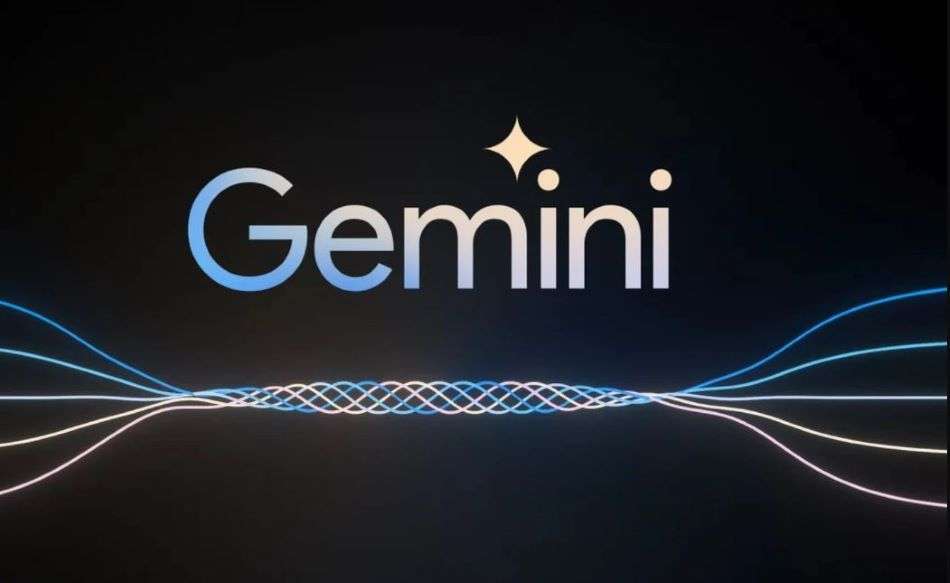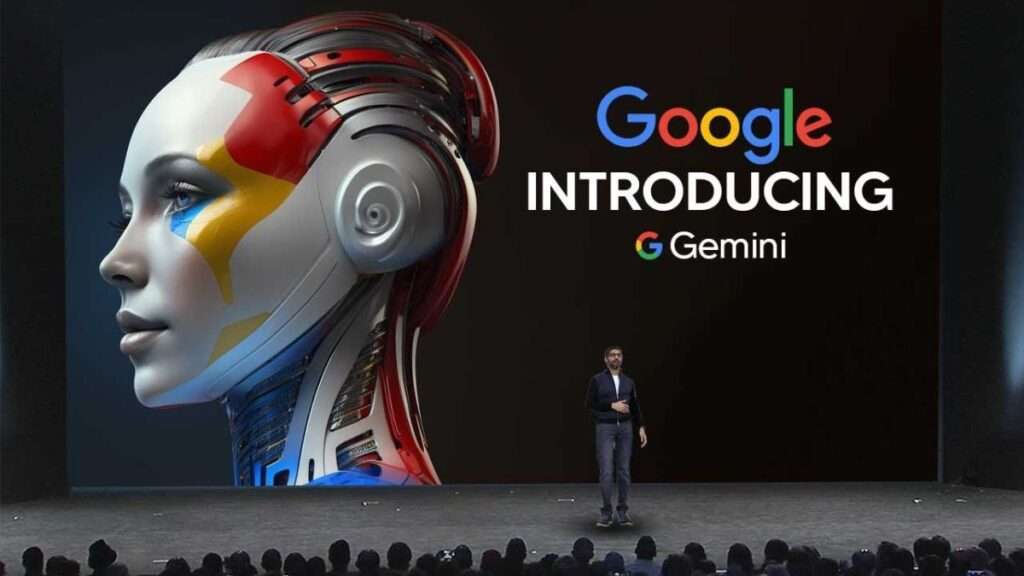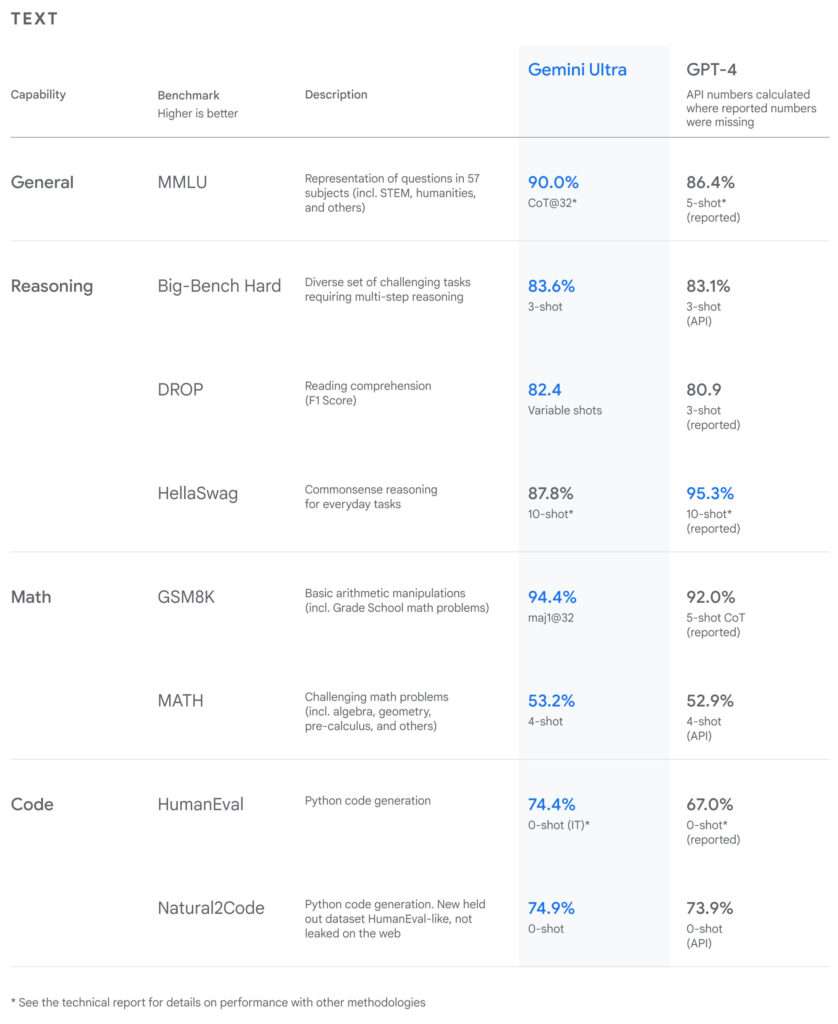Gemini AI: Beyond Competition, Towards a New Era of Artificial Intelligence

The landscape of artificial intelligence is undergoing a rapid transformation, and Google’s groundbreaking Gemini AI stands at the forefront of this revolution. This powerful model promises to reshape our interaction with technology, pushing the boundaries of what AI can achieve. But Gemini is more than just a competitor to existing models; it represents a paradigm shift in the way we think about and develop AI.
Key Takeaways
- Gemini AI’s introduction: Google’s Gemini AI marks a significant leap in AI, emphasizing innovation and responsible development.
- Versatile models: Gemini AI offers Nano, Pro, and Ultra versions, tailored for specific tasks and users, from basic to complex applications.
- Technical differentiation: Gemini AI and GPT-4 differ in architecture, training, and performance, with Gemini excelling in multimodal tasks.
- Advancements in AI: Gemini AI introduces novel architecture and multimodal capabilities, outperforming GPT-4 in specialized domains.
- Collaborative AI future: Envisions AI models working together to tackle challenges, promoting a collaborative ecosystem over competition.
The Genesis of Google Gemini AI Project
The genesis of GEMINI AI can be traced back nearly a decade to Google’s recognition of Artificial intelligence immense latent potential. As Sundar Pichai articulated, AI represents a monumental shift in technological capability, one that may eclipse even the mobile and internet revolutions. This perspective fueled Google’s drive to lead in leveraging AI to propel human progress.
After years of dedicated research, GEMINI AI emerged as the crystallization of this vision – not merely a product but a symbol of Google’s AI-centric ethos and their commitment to advancing this transformative technology responsibly. GEMINI’s launch marks a significant milestone in their patient, deliberate journey to harness AI for the benefit of society.
The Three Faces of Gemini AI Model: Tailoring Capabilities to Diverse Needs
Gemini’s unique approach lies in its three distinct versions: Nano, Pro, and Ultra. This allows for a more nuanced and tailored application of AI, ensuring that each version is optimized for specific needs and use cases.
Nano: This lightweight version is ideal for basic tasks like text generation, translation, and information retrieval. Its small footprint makes it ideal for resource-constrained environments and allows for easy integration into various applications. Access through Google Bard.
Pro: This mid-tier version offers significantly more muscle than Nano. It can handle demanding tasks like code generation, complex question answering, and creative content writing. Pro is ideal for businesses and developers looking to leverage AI for more advanced tasks.
Ultra: Currently under development and rigorous testing, Ultra represents the pinnacle of Gemini’s capabilities. It promises to surpass even the most powerful language models available today. With its ability to handle complex reasoning, multi-modal understanding, and advanced problem-solving, Ultra will have a profound impact on research, scientific discovery, and various other fields.
By offering three distinct versions, Gemini ensures that its capabilities are accessible and valuable to a wide range of users and applications. This democratization of AI paves the way for a future where everyone can benefit from the power of this revolutionary technology.

Gemini vs GPT 4: A Comparison of Technical Approaches
While both Gemini AI and OpenAI’s GPT-4 are considered cutting-edge language models, their approaches to achieving impressive performance differ significantly. Here’s a detailed comparison of their technical aspects:
Architecture:
- GPT-4: Utilizes a Transformer-based architecture, similar to its predecessors, with a significant increase in model size and parameter count. This allows for greater capacity and improved performance on various tasks.
- Gemini AI: Leverages a novel architecture incorporating multimodal transformers, designed to seamlessly process information from diverse sources like text, code, audio, images, and videos. This allows for a deeper understanding of complex contexts and facilitates more nuanced reasoning and decision-making.
Training Data:
- GPT-4: Trained on a massive dataset of text and code, significantly exceeding the size of previous models. This allows for broader knowledge and improved performance on general language tasks.
- Gemini AI: Trained on a smaller dataset, but strategically curated to focus on specific areas of expertise. This allows for deeper knowledge and superior performance in targeted domains.
Performance Metrics:
- GPT-4: Demonstrates impressive performance on various benchmarks, including text generation, translation, and question answering. However, its performance can be inconsistent on tasks requiring multimodal understanding or reasoning over complex contexts.
- Gemini AI: Exhibits exceptional performance on tasks requiring multimodal understanding, reasoning, and problem-solving. It surpasses GPT-4 in areas like image and video understanding, speech recognition, and complex question answering.
Technical Advantages of Gemini AI:
- Multimodal Capabilities: The ability to process information from diverse sources gives Gemini a significant edge in understanding complex contexts and generating more insightful responses.
- Focus on Specific Domains: By focusing on specific areas of expertise, Gemini achieves superior performance within those domains, leading to more accurate and reliable results.
- Efficient Architecture: Despite being trained on a smaller dataset, Gemini’s efficient architecture allows it to achieve performance comparable to or exceeding GPT-4, demonstrating its superior computational efficiency.
Potential Applications:
- Gemini’s multimodal capabilities make it ideal for applications requiring deeper understanding and reasoning, such as:
- Scientific research and discovery: Analyzing vast datasets and uncovering hidden patterns to accelerate scientific progress.
- Personalized education and learning: Tailoring educational experiences to individual needs and learning styles to optimize learning outcomes.
- Creative content generation: Producing original and engaging content across various media formats, including text, audio, and video.
- Development of intelligent assistants and chatbots: Creating more natural and engaging conversational experiences for users.
Beyond Competition: A Glimpse into the Future
The arrival of Gemini AI signals the beginning of a new era in AI development. This shift transcends mere competition between models; it represents a fundamental change in how we approach AI design and application. Instead of focusing solely on achieving benchmark performance, Gemini paves the way for a more collaborative and interconnected AI ecosystem.
Imagine a future where AI models like Gemini work together, leveraging their individual strengths to tackle complex challenges and drive innovation across various fields. This collaborative approach could lead to breakthroughs in areas like:
- Scientific discovery: AI models could analyze vast datasets and uncover hidden patterns, leading to new discoveries in medicine, materials science, and other fields.
- Climate change mitigation: AI could be used to optimize energy usage, design sustainable infrastructure, and develop innovative solutions to combat climate change.
- Personalized education: AI could tailor educational experiences to individual needs and learning styles, ensuring that every student receives the best possible education.
- Global communication: AI could break down language barriers and facilitate seamless communication between people from different cultures and backgrounds.
A Call for Responsible Development
While the potential of Gemini AI is undeniable, it is crucial to consider the ethical implications of this powerful technology. We must ensure that AI is developed and utilized responsibly, addressing concerns about bias, safety, and transparency. By fostering a collaborative and ethical approach to AI development, we can harness its potential for good and create a brighter future for all.
Artificial Intelligence Pivotal Moments
Google’s Gemini AI marks a pivotal moment in the field of artificial intelligence. Its remarkable capabilities, diverse applications, and ongoing development suggest a future where AI plays an increasingly crucial role in our lives. As we move forward, it is imperative to remain informed and engaged in the conversation surrounding AI, ensuring that this powerful technology is used for the benefit of humanity.
Technical Aspects Comparing Gemini AI with GPT 4





